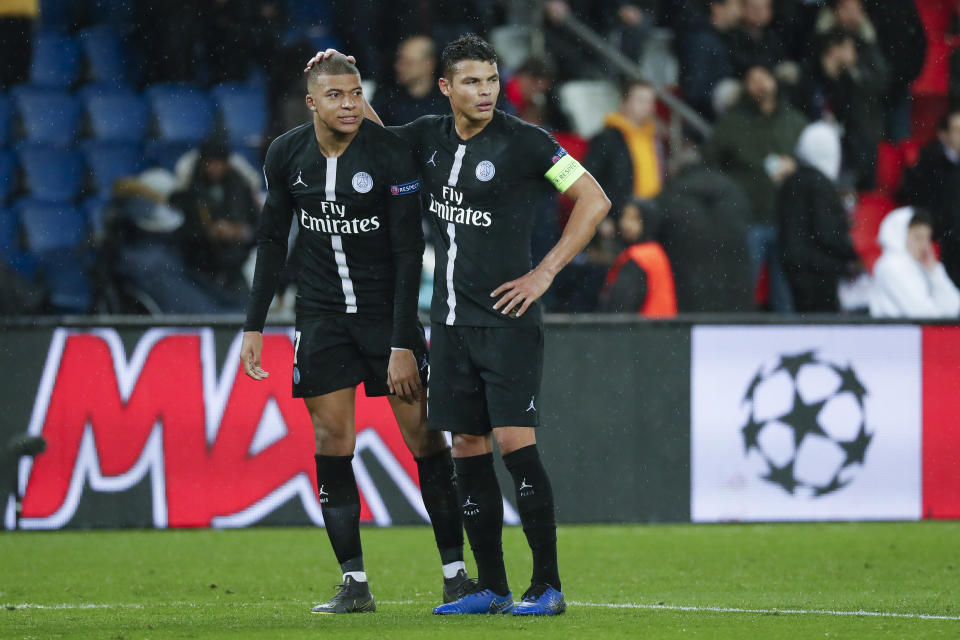PSG's Champions League fortunes won't change until the club changes its zero-sum gamesmanship

Paris Saint-Germain president Nasser al-Khelaifi put a four-year deadline on winning the Champions League.
That was five years ago.
Now PSG has suffered its most humbling Champions League defeat under Qatar Sports Investment ownership.
That was five hours ago. And the embarrassment will linger for much longer than that.
However you spin it, time is not on PSG’s side – sardonic, because time is the one thing the club isn’t willing to spend.
Wednesday’s loss to Manchester United will be talked about for referee Damir Skomina’s decision to award a late penalty. It will be talked about for further confusing the definition of a handball. It will be talked about for Gianluigi Buffon’s blue moon blunder that led to the second goal.
Let’s talk about it for PSG, too.
United was without suspended superstar Paul Pogba, down two away goals entering the second leg, and inexplicably lethargic going forward for much of the second half. This is a game PSG should have won going away.
Instead, the French giants are the only thing “going away” now. For the seventh straight season, they won’t get past the Champions League quarterfinals. For the third straight season, they won’t even get past the round of 16.
And they can’t just throw money at this. Throwing money at this is what got them here.
Oh there’s a hint of positive connotation to that, for sure. When QSI purchased PSG in 2011, the Doha-based shareholding organization armed the club with the capital needed to ascend the ranks of world soccer. It was the signature investment of a broader plan to make headway inside the borders of a longtime trade and economic partner, the showpiece property of a sports portfolio that included the 2022 FIFA World Cup, and there’s no greater show than the Champions League.
So al-Khelaifi, who doubles as the chairman of QSI, played it coy at first. Then he came right out and said it in 2014.
“I want us to ... go as far as possible in the Champions League,” he told French newspaper L’Equipe, as translated by ESPN’s Ian Holyman. “That competition we have to win within the next four years at most.”
That’s the problem, which has become PSG’s Champions League problem. Winning Europe is the name of the its game, and that game is zero-sum.
By itself, making the Champions League the ultimate goal isn’t an issue. All the elite teams want to do that. Ambition is important.
So is strategy.

PSG’s focus has been less about team-building and more about star-hoarding. Big signings aren’t given much room for growth. Meet expectations, or meet the exit.
The Parisians famously bought the past-his-prime David Beckham because “he is a brand.” The list of their annual transfer expenditures reads like a team of the tournament: Zlatan Ibrahimovic, Thiago Silva, Edinson Cavani, David Luiz, Angel Di Maria, Julian Draxler, Kylian Mbappe.
The chief prize, Neymar, missed this year’s knockout stage clash against Manchester United with a foot injury, and his tendency toward frailty is a whole other matter. He missed the return leg of PSG’s round of 16 loss to Real Madrid last season due to injury, too.
For all the money, there’s a through line that keeps burying PSG in the Champions League. The nouveaux riches come up short every time they run into a club whose stratosphere of success and aspiration they seek to emulate. Frequently, these teams are more of a, well, team.
Sometimes, they lose to the eventual trophy-raisers, like last spring against Real Madrid and in 2015 when they were smoked by Barcelona. The rest of the time, they lose on away goals, which by definition are the finest of margins. It happened in 2013 vs. Barcelona, and 2014 vs. Chelsea, and 2016 vs. Manchester City, and Wednesday vs. Manchester United.
Even a defense of their infamous 2017 choke job against Barca, when they failed to see out a four-goal advantage and lost the second leg 6-1, could be pieced together through the presence of history’s greatest attacking trident of Lionel Messi, Luis Suarez and, humorously enough, Neymar.
It’s just that there’s always an excuse. And there’s always an excuse because losing dictates the need for one.
Compare PSG’s growth arc to Manchester City. The Citizens were also purchased by a Middle East-based group around the turn of the decade, and they’ve only reached the Champions League semifinals once. However, they’ve also won the Premier League and their domestic cups, which thanks to broadcast rights and sponsorships are more lucrative, challenging and prestigious than what’s available to PSG. As such, you don’t hear as much about their relative failures in Europe.
Outwardly, PSG will dangle its domination of Ligue 1 and the Coupe de France. By nature, this is reductio ad absurdum. PSG doesn’t have rungs. It isn’t trying to climb a ladder. It’s trying to summit a mountain in one jump.
To do that, you need a foundation. You must have stars to win, but they can only drag you so far. PSG’s ploy in this regard is big on spending but not always on thought.
That’s how you get analytical maps like this:
Two-legged xG map for PSG - United.
Yup, that was the shot map that took them through. I just accept this as normal now. pic.twitter.com/Vim1YqglbR— Caley Graphics (@Caley_graphics) March 6, 2019
United’s organization and opportunism won out. Any team will be vulnerable if it doesn’t feature the same qualities.
So what’s the solution for PSG?
How about “unattainable?”
Unless al-Khelaifi realizes how haphazard his approach has proven to be, it’s hard to see things shifting. PSG’s academy is still in afterthought, and the club is currently bickering over a contract extension with its best graduate. Thomas Tuchel is a fine manager, but like Carlo Ancelotti, Laurent Blanc and Unai Emery before him, he’s being asked not to implement his own vision, but do the best he can with the expensive parts he’s given.
This is not the way to win Europe. PSG is busting in its boom-or-bust proposition. The proof is in the results.
The French giants are sinking an awful lot of money into this. And until things change, they’ll only be sinking.
Joey Gulino is the editor of Yahoo Soccer and moonlights as a writer. Follow him on Twitter at @JGulinoYahoo.
More from Yahoo Sports:


